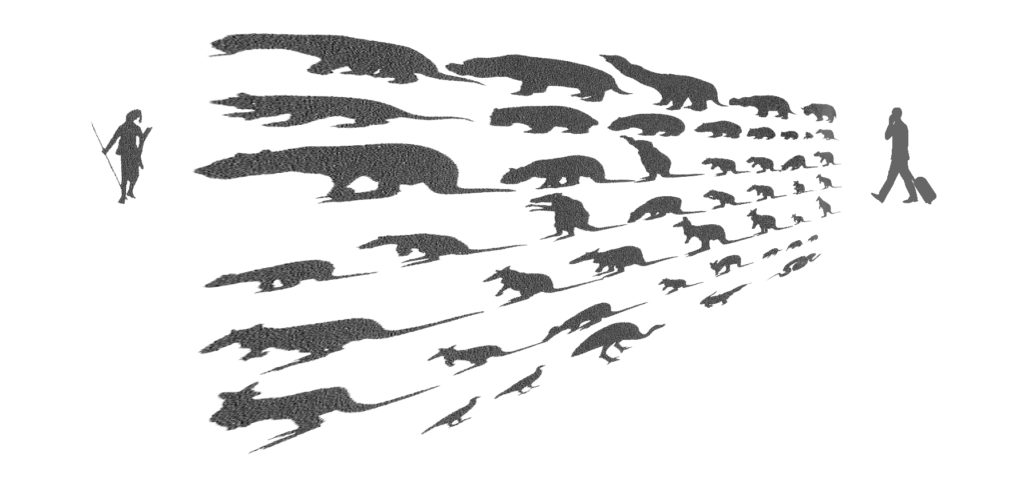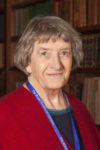Ripping Yarns: Two Lives in Zoology
Lunchtime Lecture
Speakers:
Professor Lynne Selwood AO, School of BioSciences, The University of Melbourne
Emeritus Professor James Warren, School of Biological Sciences, Monash University
There are few fields of science that combine the excitement of exploration and discovery with the alarm of an unfolding crisis quite like zoology.
The long view of palaeontology defines our time in evolutionary history as the Holocene – a period of just over 10,000 years, beginning at the end of the last Ice Age, in which humans have come to dominate numerous families of animals and plants, transforming diverse habitats through our activities and ushering in a new era of biodiversity disruption and loss. With the advent of the Industrial Revolution and the sharp rise in global industrial activity during the last century, it has been suggested that the mid-20th century has made itself different enough from the rest of the Holocene to consider it a new geological epoch, known as the Anthropocene.
There are dire predictions for the massive loss of threatened animal and plant species over the next century, distinguishing our current era as the planet’s sixth mass extinction event.
Our two distinguished speakers began their careers in the mid-twentieth century, just as the Anthropocene was getting started. Working in fields spanning palaeontology, evolutionary and developmental biology, Professors Lynne Selwood and James Warren have a unique perspective on the development of their fields of inquiry and the application of their science to the challenges facing our planet’s biodiversity, both locally and globally.
Join Lynne and Jim as they discuss their reasons for choosing Zoology as a field of study and inquiry, reflect on their experiences in the field and paint a picture of the interesting times a Zoologist can look forward to in their career.
 Professor Lynne Selwood AO lived and worked in NSW and London before settling in Melbourne. Here she further explored her interests in the mechanisms and evolution of early mammalian development, using captive breeding and reproductive technology to rescue endangered marsupials and assert fertility control of overabundant marsupials.
Professor Lynne Selwood AO lived and worked in NSW and London before settling in Melbourne. Here she further explored her interests in the mechanisms and evolution of early mammalian development, using captive breeding and reproductive technology to rescue endangered marsupials and assert fertility control of overabundant marsupials.
Lynne served on the Society’s Council for thirteen years and was the first woman to be elected President of the Royal Society of Victoria (2010 – 2013). Lynne continued to serve with the Society’s Executive Committee as Immediate Past President from 2013 to 2017.
In 2017, Lynne was made an Officer of the Order of Australia (AO) for distinguished service to tertiary education in the field of reproductive biology as an academic, researcher and author, to the conservation of marsupial animals, and to the promotion of science.
Lynne continues to oversee the Society’s affairs through her lifetime appointment as a Trustee.

Emeritus Professor James Warren‘s move to Australia from the United States in 1962 catalysed the beginning of a long and distinguished career at Monash University. Upon his arrival Jim took up a lectureship in the Department of Zoology and Comparative Anatomy (now the School of Biological Sciences). Jim’s previous research had taken him to far flung reaches of the globe. He had previously worked as a mammalogist with an ecological survey of the arctic regions of Alaska and also studied the major paleontological collections in the USA.
He brought his passion for evolutionary biology to his new role, which led to Monash becoming the first University in Australia to actively research vertebrate palaeontology. In 1968 Jim was appointed as Professor and Head of Department. Over his many years at Monash as a teacher Jim had a particularly close association with first year Biology.
Jim’s long-term position of Department Head came to an end in 1994 when he was offered the position of Dean of Faculty of Science (1994-1996), followed by an appointment as the Pro Vice-Chancellor of Monash University’s Malaysian campus. Upon his retirement in 2000, Jim was appointed as Emeritus Professor of Biology at Monash University.






